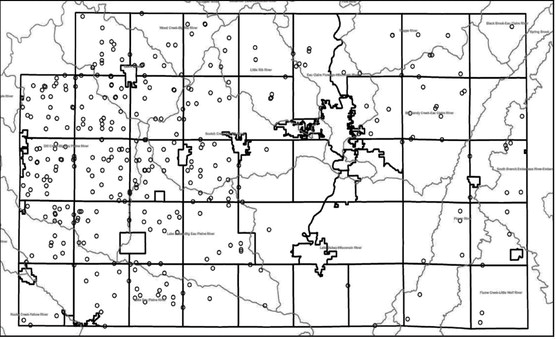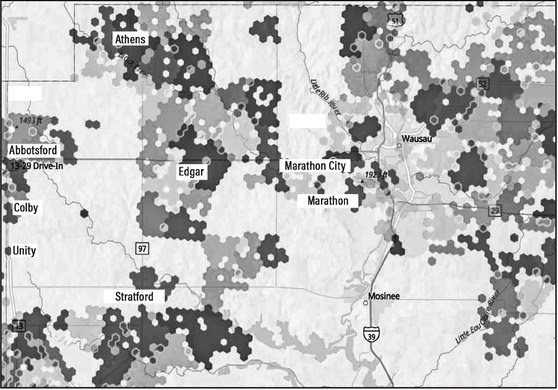Farmers split on Trump’s agenda
By Kevin O’Brien
Two Marathon County farmers, one a Trump supporter and the other not, were recently asked what they thought about the president’s plans for mass deportations and possible tariffs on Mexico and Canada. Not surprisingly, they offered much different perspectives on the hot-button topics, but they did agree on the ongoing importance of agriculture in Central Wisconsin.
Randy Wokatsch, a farmer in the town of Marathon, said he supports President Trump’s efforts to deport illegal immigrants and impose tariffs on other nations, even though he acknowledges those actions may initially cause problems for farmers.
“First of all, if you broke the law coming here, you shouldn’t be here, so I would support deporting everyone who’s not supposed to be here,” he said. “Obama was once called the ‘deporter in chief’ by people who weren’t happy about it. He deported millions of those here illegally. Starting with the criminal ones just makes sense to me.”
Wokatsch said he understands that enforcing immigration laws will cause farmers “pain,” but he also points out that unregulated immigration has led to the loss of job openings for American citizens and added stress to the country’s educational, medical and criminal justice systems.
“There’s been a lot of pain with this, and that’s what happens when laws aren’t followed,” he said. “Now there’s going to be more pain.”
When asked how he thinks farmers and other employers will respond if they lose a sizable number of their employees due to mass deportations, he said “That’s a really good question that I don’t have a really good answer for.”
“You shouldn’t have based your business
See FARMERS/ page 8 Farmers
Continued from page 1
plan on having people that are here illegally,” he said. “You might know that there would be consequences for that, so I don’t really feel too bad for them having that problem.”
As a small-scale farmer who had to sell off his cows in 2019, Wokatsch said he can sympathize with others who may be squeezed out of the market by larger operations with better economies of scale that are rewarded for producing larger quantities of milk. However, he said a lot of larger farms got that way by taking advantage of grants to expand their facilities and by hiring non-citizens.
“They wouldn’t have been able to get that large if they would not have had access to these illegal workers,” he said. “That was one of the enabling factors that allowed that to happen.”
Wokatsch also believes wages have been driven down by illegal immigration, and that deportations will lead to Americans being offered higher wages by employers who can no longer rely on cheap labor. At the same time, he said he has no problems with immigrants here on work visas and reforming the system for people to come here legally.
“I’m not anti-immigration at all,” he said. “I think Congress has been delinquent in addressing immigration for decades. We should have something more updated. I’m all for legal immigration.”
Looking ahead, if the Trump administration is successful in removing large numbers of undocumented immigrants, Wokatsch said the administration will also have to help find ways of filling those jobs.
“I do think it’s going to put some of these farmers in a bad place, at least in the short term,” he said. “When you’ve built your business on a house of cards like they kind of did, what do you do when the cards fall down? I don’t know.”
Wokatsch said he and others may have been skeptical about some of President Trump’s tariffs, but he believes they’ve proven to be effective so far, pointing to Colombia’s decision to take back immigrants after Trump threatened the country with tariffs.
“I’ve learned to trust him, that he’s got a plan,” he said. “Look at how many times he has already successfully negotiated by means of these tariffs.”
While acknowledging that he doesn’t know what the full impact of the tariffs will be, Wokatsch said he believes President Trump has the best interest of the nation and its farmers at heart. He also noted that the United States has a lot of sway and believes Mexico and Canada will eventually come around to negotiate.
“When we speak, people listen,” he said. “We’re an economic powerhouse, and we haven’t used that to our advantage all of these years, and Trump’s leveraging that.”
Another perspective
A Marathon County dairy farmer, who requested anonymity in order to protect his workers, said whenever his farm hires a new employee, they require both a Social Security card and photo identification, whether it’s a driver’s license or a state-issued ID card.
“As an employer, that’s our job to get those two forms of identification and to get the I-9 in place” he said, referring to the Employment Eligibility Verification form used to confirm that is someone is legally allowed to work in the United States.
The farmer said the I-9 process works best for seasonal workers who are needed to harvest vegetables for a limited time, but it’s not as useful for dairy farmers who need yearround employees who can work every day.
“If people think about their own businesses, you train somebody and then they’ve got to leave in three or months, that does not work for many of our food systems,” he said.
Many of his employees have to travel to Minneapolis or Chicago to attend court proceedings and pay a “crazy” amount of attorney fees just in order to stay in the country and work here – a process he says will “string on for years and years.”
“The system we have right now is tremendously flawed and not working well,” he said.
The farmer said it’s important to remember that reliable food production is essential for national security, and immigrants are a vital part of making the food system work.
“We have really hardworking contributors to our society, doing jobs that would be impossible to fill,” he said. “They would just absolutely be impossible to fill.”
Farm workers in America’s Dairyland are integral to providing food for not only the country, but the rest of the planet, he said.
“We’re blessed here to have one of the best places in the world to grow food, to produce food for the 9 billion people that live in the world,” he said. “We’re just blessed. I believe it’s our responsibility to do that.”
When it comes to the debate over immigration, he said one thing needs to be made clear right away: “Ninety percent of the people involved getting in food from the field to people’s table are immigrants doing the hard work. To make a generalization that they are rapists, murderers and thieves is not fair.”
At the same time, the farmer said he has “zero problems” with deporting immigrants who are committing other crimes.
“Are there bad people? Sure,” he said. “Let’s find them, let’s remove them.”
However, he said lawmakers need to “reach across the aisle” and find a solution that is reasonable and workable for the millions of immigrants who are “hardworking people paying Social Security taxes and doing the work that nobody born here wants to do anymore.”
He said people might assume that a lot of immigrants doing farm work will be passed over by deportation efforts, but not all of them have the protections needed to stay in the country. He noted that many immigrants have been here since at least the late 1990s, and are actively contributing to their communities and school districts.
The farmer said he recently had a staff meeting with his workers and asked his milkers how they were doing.
“They’re like, ‘If we go to WalMart and don’t come back, are you going to take care of our family?’I’m like ‘Absolutely.’They’re like my family.”
The farmer said he remembers some promising legislation being proposed in the past that would have helped migrant workers stay in the country without fear of deportation, but those have failed to pass. Any conversation about immigration needs to start with the acknowledgement that at least 90 percent of the milk people drink and 90 percent of the meat they eat comes “at the hands of people who weren’t born here,” he said.
“I don’t care what side of the aisle you’re on,” he said. “Let’s agree to that.”
On the issue of tariffs, the farmer said consumers need to realize how important America’s trading partners are when it comes to keeping the dairy industry healthy.
“From a dairy farmer’s perspective, Mexico is critical,” he said. “Of all our dairy products, we export close to 20 percent, and Mexico is by far our biggest customer.”
Like any other business, companies involved in the dairy industry are interested in developing long-term relationships with buyers, including those in other countries, so the idea of massive tariffs is disruptive, he said.
“When there’s uncertainty, they’re going to find out a different place to get it from,” he said. “That would be devastating to the price of milk that we get.”
When asked about the subsidies the previous Trump administration provided to farmers when tariffs were imposed, he said that’s not a viable alternative over the long term.
“There’s absolutely no farmer that wants to lose market for a government payment,” he said. “It doesn’t have longevity. It’s just a short-term Band-Aid.”



